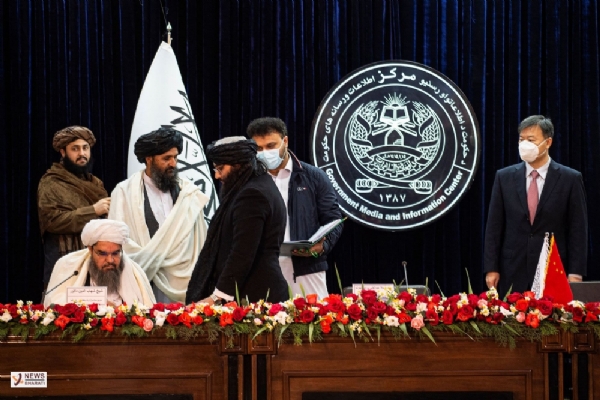China’s Oil Diplomacy in Afghanistan
The Chinese company has obtained rights to explore five oil and gas blocks in Amu Darya spread over 4500 km and estimated to have 87 million barrels of oil.
Total Views |
China achieved a major diplomatic breakthrough in Afghanistan in the first few days of 2023 when it successfully signed a 25-year oil exploration deal in Taliban-led Afghanistan. China’s Xinjiang Central Asia Petroleum and Gas company, a subsidiary of China National Petroleum Corporation (CNPC) signed a deal to invest US$ 690 million for oil exploration in Amu Darya basin located in Northern Afghanistan. Out of this, US$ 150 million in the first year, whereas remaining US$ 540 million will be invested over the subsequent three years.

The Chinese company has obtained rights to explore five oil and gas blocks in Amu Darya spread over 4500 km and estimated to have 87 million barrels of oil. The deal has been signed for 25 years when the Taliban government will receive 20 percent royalty when 200 tonnes daily oil production begins which will be gradually increased up to 1000 tonnes. A Chinese company will also set up a refinery so that it can also meet Afghanistan’s energy needs in future. Currently, Afghanistan has to import oil from Turkmenistan, Iran and Uzbekistan due to lack of refinery facilities.
This is the first major international deal signed by the Taliban government since they captured power in August 2021 as its sources of revenue continue to shrink due to reluctance of major powers to recognize their legitimacy. Despite the lack of official diplomatic relations with Afghanistan, China decided to sign this deal which indicates China’s tacit support to the Taliban regime. China is also among the few countries to have full diplomatic presence in Kabul since August 2021. A similar deal was previously signed in 2011 by China with the Ghani government. However, it was later scrapped due to indefinite delays. Thus, the new deal mandates a deadline of one year after which the project can be shut down if no progress is achieved. For Afghanistan, the success of this deal is extremely important as it will release financial burden on the government to some extent. Till 2021, international aid accounted for around 40 percent of Afghanistan’s GDP which was suspended after Taliban took over power. Thus, if this deal succeeds, Taliban may hope to attract similar deals from other countries related with exploration of natural resources. On the contrary, Considering China’s huge oil demand, this project in Afghanistan would not substantially help China in diversifying its oil import sources. However, this project will create an opportunity to establish its own network in Afghanistan and thereby, increase foothold in the region. Further, this project will also help to increase security presence in Northern Afghanistan and take help of Taliban to curb East Turkestan Islamic Movement (ETIM) that support Uyghur insurgents as both countries share a border of around 76 km. More importantly, Afghan insurgent forces also pose a severe threat to the China-Pakistan Economic Corridor which can be reduced with increasing Chinese presence in Afghanistan. Hence, this project has a significant strategic value for China, if not monetary and energy security gains.
Challenges for China in Afghanistan
Despite several potential gains from this project, it is not devoid of challenges. First and foremost challenge is created by ISIS-Khorasan group that continuously attacks foreign nationals in Afghanistan, especially Chinese citizens. In December 2022, this group attacked a hotel in Kabul where around 30 people were killed reportedly, many of whom were Chinese businessmen. There have been other similar instances also where foreign nationals, especially Pakistani, Russians and Chinese, were targeted in the last one year. These attacks are being carried out to protest against support provided by these countries to Taliban regime. Thus, what Taliban used to do in 2011 against Ghani government is now replicated by ISIS-K and now Taliban stands responsible for protecting foreign interests in Afghanistan.
Also Read: China’s New Arabian Diplomacy
There are other militant organizations like Al-Qaeda, Tehrik-i-Taliban Pakistan and others which are against any direct foreign intervention in Afghanistan, be it by China or by the USA. Thus, China’s assistance in Afghanistan is bound to come with a human cost. As a result, a Taliban spokesperson has repeatedly clarified in the past few months that the Taliban regime owns responsibility for protecting Chinese citizens and all other foreigners who visit Afghanistan either for business or even for tourism. Despite these assurances, Chinese companies find it difficult to work in Afghanistan owing to concerns about security of workers as well as of installations built with Chinese capital.
China’s Energy Security Needs
China’s interests in Afghanistan’s natural resources dates back to the 2000s when Metallurgical Corporation of China had acquired rights for copper mines in Mes Aynak, located 40 km southeast of Kabul. It is considered as one of the largest copper mines in the world. However, security concerns have led to several delays in this US$ 3 billion project. Nonetheless, after the recent oil deal, there are reports that this project is again being discussed. There are also reports that Chinese companies have also begun inspections for extracting lithium resources in Afghanistan with Taliban’s approval. With respect to this project, it can also be an opening for China to extend the Belt and Road Initiative in Afghanistan by constructing roads and railways from Kabul to Peshawar and Quetta to Kandahar. China’s long-term plans are to link mining areas in Afghanistan to the China-Pakistan Economic Corridor to access mineral resources at cheaper cost. China has also signed energy cooperation agreement with Afghanistan under BRI framework in 2019. However, considering delays and resentment among locals about CPEC projects, this extension plan is likely to attract more opposition to China’s BRI in this region and costs may outweigh benefits from this project.
This deal also indicates China’s efforts to fill the vacuum created by the US withdrawal which can be achieved if China maintained amicable relations with Taliban. It is evident from the fact that China hosted a high-level delegation in July 2021 in Tianjin to discuss the future course of relations between China and the Taliban. After this meeting, then Foreign Minister of China Wang Yi called Taliban “a pivotal military and political force” which shows China’s efforts to get along with the Taliban regime. Further, as Pakistan’s economic and political conditions continue to deteriorate, good relations with the Taliban can help China to hold its influence in the region and protect multi-billion investments. However, implementation of the project will be the most difficult part for China as the challenges are multi-pronged. Further, Russia’s invasion in Ukraine has reoriented Western powers near Central Asia which can prove detrimental to Chinese strategy. Further, China has to avoid Afghanistan’s record of leading empires to graveyards and thus, China cannot continue to accrue benefits without reciprocal gains for the locals. Hence, this deal offers China an opportunity, albeit with challenges, to install peace in Afghanistan through economic development and if China succeeds, other countries like India may also consider exploring other untapped resources in return for development.


